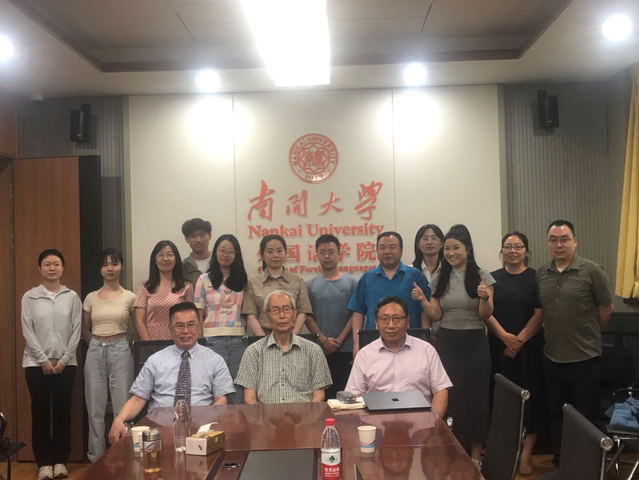
On the afternoon of June 17, 2024, Professor Yuan Haiwang was invited to Nankai University’s School of Foreign Studies to deliver an academic lecture titled “Domestication or Foreignization: Theories and Practices of Translation Strategies”. He is former professor from Western Kentucky University, guest professor at Nankai University’s School of Foreign Studies, advisor to the Center for the Translation of Chinese Poetry, and member of the Chinese Culture Translation and Studies Support Network. The lecture was chaired by Professor Yan Guodong, dean of the School of Foreign Studies, with notable attendees including translator and founding dean of the school, Professor Liu Shicong, Vice Dean Professor Ma Hongqi, Director of the Translation Department Professor Zhang Zhizhong, Deputy Directos Zhang Qiang and Li Chunjiang, and teachers Shang Ruiqin, Li Lei, and Luan Haiyan, as well as postgraduate and doctoral students specializing in translation.
Professor Yuan Haiwang began the lecture by defining domestication and foreignization, introducing the relevant theoretical background and practical impacts. Through a series of instances, he pointed out that by using appropriate annotations and reasonably adopting foreignization translation strategies, it is possible to maintain the unique cultural elements of Chinese texts, making them both easily understandable and distinctive in the target language. Afterwards, Professor Yuan analyzed the connection among domestication, foreignization, and translation accuracy, elaborating with cases from literary works and political terminology. He emphasized that factors such as the translation purpose, target reader, original text genre, and editing process all influence the translator's strategy choice. Therefore, translators should not be confined to absolute judgments of right or wrong regarding translation strategies but should flexibly use both domestication and foreignization techniques.
Additionally, Professor Yuan highlighted the critical importance of cultural sensitivity in translators. Drawing on his experience translating Chinese cultural texts and instances from Howard Goldblatt’s translations of Mo Yan’s works, he stressed that translators must understand and respect cultural differences. As cultural bridges, translators bear the responsibility of promoting cross-cultural communication and the mission of telling China’s story to the world. High-quality translations should balance fidelity and the effectiveness of cross-cultural communication. Professor Yuan further discussed different models of Sino-foreign translator collaboration in English translations and reiterated the importance of translators having a profound understanding of the culture of source language by citing cases of mistranslation.
Professor Yuan also explored the collaboration model between human translators and ChatGPT, based on practical experience. He advocated for active cooperation between translators and ChatGPT to enhance translation efficiency while firmly opposing reliance on ChatGPT for translations. He suggested leveraging ChatGPT for functions like reference corpus, grammar checking, and American-English to British-English conversion. He noted that ChatGPT excels in information-based texts but has significant shortcomings in handling literary texts, which often involve cultural and contextual information. He emphasized that human translation can better manage ambiguous language and reflect the translator's emotional experience, cultural perspective, and political stance. Hence, ChatGPT translations of literary texts require more human intervention. Professor Yuan urged contemporary translators to use ChatGPT as a tool, supplementing AI-assisted translation with human post-editing to foster strengths and circumvent weaknesses.
During the Q&A session, Professor Liu Shicong and Professor Yuan Haiwang exchanged views on AI translation. They both agreed that relying on ChatGPT for translations is inadvisable. Professor Liu, referencing the English translation of Dream of the Red Chamber, pointed out that the novel’s many vivid characters and diverse personalities are difficult for AI to faithfully reproduce. He also expressed concerns about whether AI translations could accurately reflect the folk and temporal characteristics of literary characters' language. Professor Yuan recommended strengthening human intervention when applying AI translation and making good use of ChatGPT’s dialogue function. They concurred that while AI translation has reference value, it has evident limitations in understanding the emotional nuances of the original work and presenting the translator’s style, making it unlikely to completely replace human translators. After that, the attending teachers and students were eager to pose questions, engaging in in-depth interaction with Professor Yuan on topics such as poetry translation by AI, human-machine collaboration techniques and models, and translation language.



